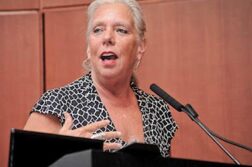Richard Canning
THE AUTHOR of four groundbreaking novels, Mark Merlis died at age 67 on August 15, 2017, in Philadelphia’s Pennsylvania Hospital. The cause of death was pneumonia, related to ALS, or Lou Gehrig’s disease, which he had been diagnosed with just a year ago. Merlis is survived by his life partner—and since 2014 husband—Robert Ashe, and two brothers.
Born in 1950, Mark Merlis was raised in Baltimore by his Jewish father, a doctor, and his Catholic mother. He earned a B.A. in English from Wesleyan in 1971 and an M.A. in American Studies from Brown in 1976. Along with writing fiction, he had a long career in health policy consultancy that began in Maryland’s health department. Merlis moved on to the Library of Congress (1987–1995) and to the Institute for Health Policy Solutions (1996–2001). While he later referred to “tumbling into the bureaucratic life that ensnared me for the next 35 years,” he continued working freelance until he retired in 2012. He rose early, writing his fiction for two hours regularly every day, from 5:30 to 7:30 a.m. He wrote four unpublished novels before the appearance of American Studies in 1994, when he was in his mid-forties.
American Studies opens with the aged narrator Reeve bedbound in the hospital after a hustler has beaten him up. He reflects on his adolescent affair with his closeted college tutor, Tom Slater, who killed himself during the McCarthy witch hunts, and draws comparisons between their lives. Beautifully styled and structured, the novel announced the broad theme that I think is common to all of Merlis’ work: the relationship between recent or contemporary American gay lives and values and those of preceding generations. Merlis himself said in an interview he saw his work as all about “the conflation or confusion of sex and power. All the books try to get at something about gay sensibility that doesn’t directly have to do with sexual activity; a search for some ineffable thing which is other than sexual, and which I can’t articulate.” He went on to cite Walt Whitman, America’s national poet, whose concept of male-to-male adhesiveness “was about something other than fucking.” American Studies won the Los Angeles Times’ Seidenbaum Award for first fiction and the Ferro-Grumley Award for distinction in gay writing.
Merlis’ second novel, An Arrow’s Flight (1998), was his most elaborate and ambitious. It updated Sophocles’ Trojan War-era tragedy Philoctetes, relocating it partly in 1980s gay urban America. Widely regarded, and admired, as an AIDS novel, Merlis himself argued that it was “only really obliquely an AIDS book. One is expected to conclude that something like AIDS is going on. It’s really a ‘before’ novel without the ‘after.’”
Man about Town (2003), novel number three, was Merlis’ most clearly autobiographical novel. Protagonist Joel, an advisor in healthcare on Capitol Hill, finds himself abandoned by his long-term lover and is made newly aware of the callousness, self-interest, and corruption in America’s political infrastructure. As a midlife crisis descends, Joel reverts to a childhood obsession with a seductive beachwear model, determining to locate the former object of desire. Man about Town was well-reviewed, though its author would later dismiss it as “the novel nobody liked.”
Perhaps this disappointment explains the long gap before a fourth novel appeared. When JD (for “juvenile delinquent”) came out in 2015, it revealed again that Merlis was incapable of recycling anything. JD is “double-narrated.” One narrator is Martha, the widow of 1960s countercultural hero Jonathan Ascher. When approached by a would-be biographer of her husband, Martha delves into his private papers. Ascher’s journals—which comprise the second narration—reveal her husband’s bisexual past in lurid detail. The two storylines complement each other, building a devastating portrait of marital dysfunction and deceit. The Wall Street Journal review described JD as “beautifully controlled and heart-wrenching.”
He could be artistically conservative, and I don’t mean this in a negative way. He simply revered strong composition, craft, attention to detail, and an awareness of tradition. New kids on the block and momentary fads didn’t interest him. Moreover, his literary lodestars were often not in fiction. He argued when I interviewed him in 1997 that “the really strong gay literary tradition is the poetic one,” by which he meant Whitman, Hopkins, Housman, and Auden rather than anything recent. His “ideal fiction writer” was George Eliot: “I don’t have her scope, but I’d love to write something like Middlemarch.”
After this interview, I always sought Mark out when in the U.S. He was the wittiest dinner companion, always happy to turn himself into the joke. I said, desperately, in the interview: “It sounds as if you engage very closely with your reviews.” He deadpanned: “There were so few reviews [of American Studies]that it is easy to remember them all.”
________________________________________________________
Richard Canning’s most recent book is an edition of English novelist Ronald Firbank’s Vainglory (Penguin Classics).
____________________________
Paul Russell
PERHAPS the most immediately impressive of Mark Merlis’ considerable achievements in his four novels is the sheer range of his subject matter—from the Trojan War thrillingly reimagined in An Arrow’s Flight to the red and lavender scares of 1950s America in American Studies to the cultural tumult of the 1960s in Man About Town. Merlis’ work is a panoramic meditation on who we are as a culture and a melancholy rumination on what holds us in thrall, whether it’s the complex legacy bequeathed by the ancient Greeks or our own first crush in high school on “the baseball player, maybe, just stepping into the locker room, joking with his teammates, now so casually unbuttoning his shirt.”
Merlis’ novels tend to start small and then swell to a terrible grandeur. In Man About Town, an innocent swimsuit ad initiates Joel Lingeman into a lifetime of wonder and longing. In An Arrow’s Flight, certainly one of the most original novels of the last half-century, two tiny marks left on Philoctetes’ ankle by a snakebite change everything, even the fate of the most beautiful city on earth. American Studies, whose title could stand for the whole of Merlis’ fictional project, is downright claustrophobic in its mise-en-scène: two strangers, an older gay man and a young straight man, occupy adjacent hospital beds for the duration of the novel— and yet by the end, when a door clicks shut and the portal of the Invincible City closes with exquisite gentleness, the narrative has scrutinized the whole history of the American fever dream as well as conjuring the attendant carnage along the way.
Merlis understood that America is about violence, that compulsory heterosexuality is about violence, that we are all conscripts in the war machine. But at the same time, what shines through his work is the almost old-fashioned but still radical belief that being gay is, or at least might be, an alternative to all that madness, a political and spiritual rebuke to the world as it is. At heart a visionary, Merlis knew what paradise looked like and even had a pretty good idea of how we might get there, but at the same time the clear-eyed realist in him knew how nearly impossible that journey might be. In the doubled reality of An Arrow’s Flight, at once Homeric Greece and AIDS-era America, the narrator praises the “Eronauts,” those heroes of love who in that mythic decade after Stonewall “sailed west without a chart,” exuberantly living out their long-repressed desires and fantasies for the sake of everyone who had come before as well as everyone who would come after. Then, in the midst of this rapturous passage, the narrator’s tone turns elegiac, as it so often does in Merlis:
Now the sea lanes they charted have closed behind them. All they discovered, that had waited since the dawn of time to be found, swallowed up. No one will ever go that way again, not even if the cure is found. Partly because we will never own our bodies again, as they did. We are vectors now, or vessels, sources of transmission; our bodies belong to the unseen. Well, it has always been so, we have always belonged to the Fates. We just never thought the Fates were so tiny.
William Blake praised the ability to see a world in a grain of sand. For Mark Merlis, the most seemingly insignificant incident might likewise suggest a whole history-haunted universe, rich and dark and troubled, full of tender, unrequited, unrequitable love.
________________________________________________________
Paul Russell is a novelist whose books include The Coming Storm (1999) and, his latest, Immaculate Blue (2015).




